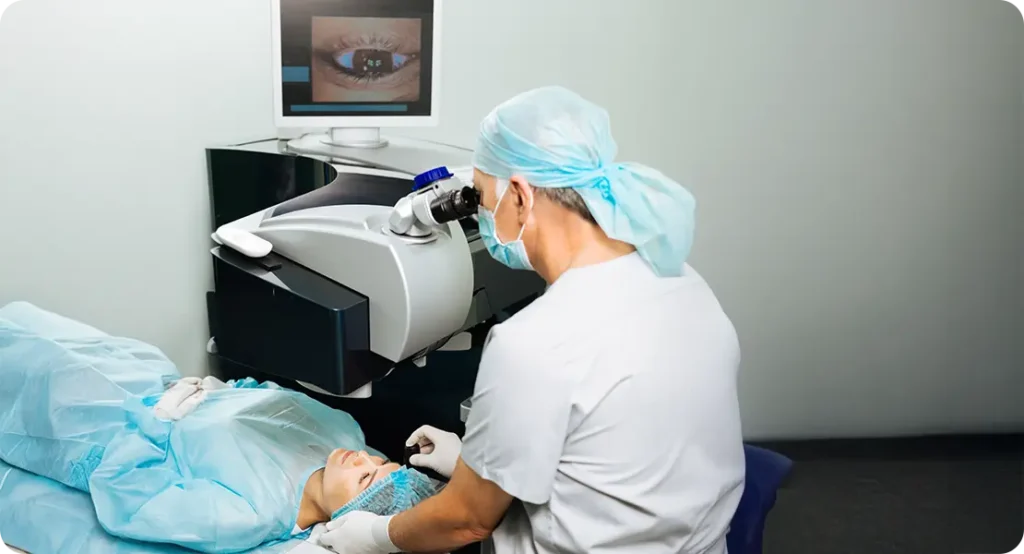If you’re taking Tamsulosin for prostate enlargement or urinary issues, you might not think it has anything to do with your eyes. But when it comes to cataract surgery, it does. This commonly prescribed medication can increase the risk of something called intraoperative floppy iris syndrome (IFIS), a complication that makes the eye more difficult to operate on.
The good news? Surgeons know about this risk and have developed reliable techniques to manage it. The key is being upfront about your medications and having a personalised surgical plan. In this article, we’ll explain why Tamsulosin matters, how IFIS works, and what you and your surgeon can do to ensure a smooth, safe surgery.
What Is Tamsulosin and Who Takes It?
Tamsulosin belongs to a class of drugs called alpha-blockers. It’s primarily used to treat benign prostatic hyperplasia (BPH)—a common condition in older men where the prostate enlarges and makes urination difficult. Tamsulosin helps by relaxing the muscles in the prostate and bladder neck, making it easier to urinate.
But here’s the twist: the iris—the coloured part of your eye—also has smooth muscles that can be affected by this medication. Even though you’re not taking it for your eyes, Tamsulosin changes how your iris behaves during cataract surgery, which is why it’s so important for your eye surgeon to know about it.
What Is Intraoperative Floppy Iris Syndrome (IFIS)?
IFIS is a condition where the iris becomes unusually floppy and unstable during cataract surgery. This might sound minor, but it can make the procedure more complex and risky. The iris can billow in response to fluid in the eye, slip out through surgical incisions, or simply not dilate enough to allow a good view of the cataract.
This floppy behaviour can result in longer surgery times and, if not managed correctly, an increased risk of complications. Fortunately, IFIS is well understood and can be managed effectively—especially when your surgeon knows you’re on Tamsulosin ahead of time.
How Tamsulosin Causes IFIS
Tamsulosin blocks alpha-1 receptors, which are not just found in the prostate but also in the iris dilator muscle. This muscle is responsible for widening the pupil. When Tamsulosin interferes with this muscle, the pupil doesn’t dilate as much, and the iris loses its usual firmness.
This effect can last for months—or even years—after you stop taking the drug. That means even if you’re no longer on Tamsulosin, you should still tell your cataract surgeon you took it in the past. The surgical team needs to prepare as if you’re still at risk of IFIS.
Why Full Disclosure at Pre-Op Matters
When you go for your pre-operative assessment, you’ll be asked to list all medications you’re currently taking. This is not the time to be modest or forgetful. Even if Tamsulosin is something you’ve been on and off over the years, it’s crucial that you mention it.
Why? Because this information affects how the surgeon plans your operation. It could change the type of anaesthetic used, how the pupil is dilated, and which surgical tools are prepared. If you don’t disclose your Tamsulosin use, your surgeon may be caught off guard by a floppy iris mid-surgery—which is far from ideal.
How Surgeons Adapt the Procedure for IFIS

Modern cataract surgery is typically fast and straightforward, but with IFIS, surgeons need to take a few extra steps. These might include:
- Using iris hooks or pupil expansion rings to keep the iris steady
- Injecting special medications into the eye to stiffen the iris and improve dilation
- Adjusting fluid dynamics during surgery to reduce iris billowing
These steps are usually enough to prevent any complications and allow for a safe, successful operation. But again, preparation is everything. Surgeons don’t want surprises in the operating theatre, especially when they can be avoided with a simple conversation during your consultation.
Should You Stop Tamsulosin Before Surgery?
This is a common question, and the answer isn’t straightforward. While stopping Tamsulosin might seem logical, it doesn’t eliminate the risk of IFIS if you’ve already been taking it. The effect on the iris may persist long after discontinuation. In fact, some studies suggest the risk can linger for years.
Moreover, suddenly stopping Tamsulosin can lead to urinary retention or worsening symptoms. You should never stop any medication without speaking to your GP or urologist first. In many cases, it’s safer to stay on it and let the ophthalmic surgeon adjust the surgical plan accordingly.
Post-Op Recovery: Does Tamsulosin Affect Healing?
Tamsulosin doesn’t directly affect how your eye heals after cataract surgery. However, IFIS can make surgery more technically challenging, which could slightly increase your risk of inflammation or delayed healing in rare cases.
To counter this, your surgeon may recommend a tailored course of anti-inflammatory eye drops post-surgery. You’ll also have close follow-up appointments to monitor your recovery. If anything feels off—such as pain, blurred vision, or light sensitivity—it’s best to report it straight away. But most people on Tamsulosin go through surgery and recovery just as smoothly as those who aren’t.
What If You’ve Had IFIS in One Eye Already?

If you’ve already had cataract surgery in one eye and IFIS occurred, it’s almost certain to happen in the other eye too—especially if you’re still on Tamsulosin. The surgical team will use what they learned from your first operation to plan the second even more carefully.
You may even find that your surgeon recommends a slightly different strategy the second time—perhaps using pupil expanders earlier or adjusting the anaesthesia method. Either way, having one IFIS experience under your belt means the next procedure can be planned with a bit more insight.
Are There Alternatives to Tamsulosin?
If you’re due for cataract surgery and haven’t started Tamsulosin yet, your GP or urologist might consider an alternative alpha-blocker with a lower risk of IFIS. However, all medications in this class carry some risk, so the difference may be small.
Still, it’s worth having that discussion—especially if your cataract surgery is imminent. In some cases, delaying the start of Tamsulosin until after surgery may be an option. But this should always be done under medical advice, weighing up your urinary symptoms against the potential for a smoother cataract procedure.
Communicating Between Your Doctors
Your GP, urologist, and ophthalmologist all have a role in your care—and it’s important they’re on the same page. If you’re seeing different specialists, make sure they know about each other’s treatment plans. Ask your GP to share your medication history with your eye surgeon. If you’re unsure what’s been communicated, take the lead and let them know.
Being proactive about your care helps avoid last-minute surprises and ensures your surgical team is fully prepared.
FAQs: Taking Tamsulosin Before Cataract Surgery
What exactly is intraoperative floppy iris syndrome (IFIS)?
IFIS is a complication that can occur during cataract surgery where the iris becomes unusually floppy and behaves unpredictably. This makes the operation more technically challenging for the surgeon. It’s most commonly linked to medications like Tamsulosin, which affect the iris muscle’s ability to stay firm and dilated during the procedure.
Does taking Tamsulosin guarantee I’ll develop IFIS?
Not everyone who takes Tamsulosin will develop IFIS, but the risk is significantly higher. Even if you took the medication in the past and stopped it months or years ago, your iris may still be affected. That’s why it’s important to let your eye surgeon know about any current or past use of Tamsulosin before your operation.
Is it safe to stop taking Tamsulosin before cataract surgery?
In most cases, stopping Tamsulosin won’t completely remove the risk of IFIS because the medication’s effect on the iris can be long-lasting. Also, stopping suddenly could worsen urinary symptoms. You should never discontinue Tamsulosin without first speaking to your GP or urologist about the risks and benefits in your specific situation.
What could happen if I don’t tell my surgeon I’m taking Tamsulosin?
If your surgeon is unaware you’ve taken Tamsulosin, they may be caught off guard by the iris behaving unpredictably during surgery. This can lead to complications or make the procedure more difficult. By disclosing your medication history, you give your surgeon the chance to plan ahead and use the right tools to manage the situation safely.
Will Tamsulosin delay my cataract surgery date?
In most cases, no. Cataract surgery can still go ahead even if you’re taking Tamsulosin, as long as your surgeon is prepared. They may adjust their technique or use specific devices to manage the risk. Only rarely would a delay be recommended—for instance, if further coordination with your GP is needed regarding medication changes.
Are there special surgical tools used to manage IFIS?
Yes, there are. Surgeons often use tools like pupil expansion rings or iris hooks to stabilise the iris during surgery. They may also use specific medications inside the eye to help keep the pupil open. These techniques are effective at reducing risk and are commonly used in patients with a history of Tamsulosin use.
Does IFIS affect my pain levels or vision outcome?
IFIS doesn’t cause pain during the operation, and you’ll be under anaesthesia to keep you comfortable. While the condition can make the surgery trickier, most patients still achieve excellent visual outcomes. As long as the surgical team is prepared, your chances of a successful result remain high.
Will my recovery be slower because of Tamsulosin?
Not usually. While the surgery might take a bit longer if IFIS is present, your healing time is unlikely to be affected significantly. Your surgeon may recommend specific eye drops to control inflammation and will monitor you closely during follow-ups to make sure everything is progressing as expected.
Are there other medications besides Tamsulosin that can cause IFIS?
Yes, other alpha-blockers such as Alfuzosin, Doxazosin, and Terazosin have also been linked to IFIS, though Tamsulosin appears to carry the highest risk. It’s important to give your surgeon a full list of all medications you’re taking—even ones that don’t seem related to your eyes.
What if I’ve already had IFIS in one eye during surgery?
If you experienced IFIS during surgery on one eye, there’s a strong chance it will happen again when the other eye is operated on. Your surgeon will take that into account and may take extra precautions the second time around. Knowing your history helps the team plan for an even smoother experience.
Final Thoughts: You Can Still Have Safe, Effective Surgery
Taking Tamsulosin doesn’t mean you can’t have cataract surgery—it just means you need a surgeon who’s aware and prepared. With the right planning and techniques, the risk posed by IFIS can be minimised, and your outcome can be just as successful as anyone else’s.
The most important step is to be completely transparent about your medications. Whether you’re taking Tamsulosin now or have in the past, don’t leave it off your pre-op form. And if you have any concerns, bring them up with your surgeon—they’re there to help you see clearly and safely.
Find Out More or Book a Consultation
If you’re preparing for cataract surgery and have questions about how your medications might affect it, the team at London Cataract Centre is here to help. Our experienced surgeons personalise every treatment plan to suit your specific health needs—including those involving Tamsulosin.
References
- Australian Prescriber, 2010. Tamsulosin‑induced intraoperative floppy iris syndrome during cataract surgery. Australian Prescriber, 33(3), pp. 88–89. Available at: https://australianprescriber.tg.org.au/articles/tamsulosin-induced-intraoperative-floppy-iris-syndrome-during-cataract-surgery.html
- Medicines and Healthcare products Regulatory Agency (MHRA), 2006. α‑1 adrenoreceptor antagonists: intraoperative floppy iris syndrome (IFIS). Drug Safety Update, August 2007; Vol 1(1), pp. 4–5. Available at: https://www.gov.uk/drug-safety-update/-1-adrenoreceptor-antagonists-intraoperative-floppy-iris-syndrome-ifis
- Christou, C.D., 2020. Intraoperative floppy iris syndrome: Updated perspectives. Clinical Ophthalmology, 14, pp. 463–471. Available via PubMed Central: https://www.ncbi.nlm.nih.gov/pmc/articles/PMC7039091/
- Tobaiqy, M., 2021. Intraoperative floppy iris syndrome induced by tamsulosin: a descriptive review. PubMed Central. Available at: https://www.ncbi.nlm.nih.gov/pmc/articles/PMC8270016/

